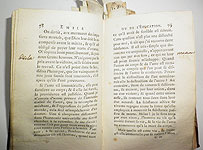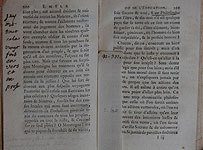“Profession of Faith of a Savoyard Vicar”. Voltaire's Notes
Rousseau's religious beliefs are often called the religion of the heart in contrary of Voltaire's deism of reason. Neither Voltaire nor Rousseau were atheists, but they discuss religious matters.Voltaire paid particular attention to the famous “Profession of Faith of a Savoyard Vicar”, introduced into the fourth book of the novel Emile, or on Education, in which Rousseau exhibited his principles in the name of a fictional character, to whom he gave some autobiographical traits.
…my bewildered understanding is convinced of its own weakness. For this reason I shall never take upon me to argue about the nature of God further than I am obliged to do by the relation he appears to stand in to myself. There is so great a temerity in such disquisitions that a wise man will never enter on them without trembling, and feeling fully assured of his incapacity to proceed far on so sublime a subject: for it is less injurious to entertain no ideas of the deity at all, than to harbor those which are unworthy and unjust," Rousseau writes, speaking of the unknowable God. For Voltaire, God is also unknowable, but he is associated not with a person, but rather with natural laws.– What does he really care whether you think ill or well of him!
After having discovered those of his attributes by which I am convinced of his existence, I return to myself and consider the place I occupy in that order of things, which is directed by him and subjected to my examination. Here I find my species stand incontestibly in the first rank; as man, by virtue of his will and the instruments he is possessed of to put it in execution, has a greater power over the bodies by which he is surrounded than they, by mere physical impulse, have over him. By virtue of his intelligence, I also find, he is the only created being here below that can take a general survey of the whole system.
– Don't you think the sun is more important than you?
Is there one among created beings, except man, who knows how to observe all others? to weigh, to calculate, to foresee their motions, their effects, and to join, if I may so express myself, the sentiment of a general existence to that of the individual? What is there so very ridiculous then in supposing every thing made for man, when he is the only created being who knows how to consider the relation in which all things stand to himself?– What a sophism!
…It is then true that man is lord of the creation, - that he is, at least, sovereign over the habitable earth; for it is certain that he not only subdues all other animals, and even disposes by his industry of the elements at his pleasure, but he alone of all terrestrial beings knows how to subject to his convenience, and even by contemplation to appropriate to his use, the very stars and planets he cannot approach.
– Excellent possessions!
Let any one produce me an animal of another species who knows how to make use of fire, or hath faculties to admire the sun. What! am I able to observe, to know other beings and their relations, - am I capable of discovering what is order, beauty, virtue, - of contemplating the universe, - of elevating my ideas to the hand which governs the whole, - am I capable of loving what is good and doing it, and shall I compare myself to the brutes?The mean soul! This is your gloomy philosophy that makes you similar to the brutes. Or rather say, you want to humiliate yourself in vain: your genius witnesses against your principles, your benevolent heart exposes your own doctrine, and even your abuse of your abilities, to your chagrin, proving your superiority.
– Does not all this prevent the animal from being as organized as you?
Rousseau considers that harmony and order reign in nature, in contrast to the human society. "What harmony: floods, earthquakes, precipice", – Voltaire comments. This remark refers to the Poem on the Lisbon Disaster and to Rousseau's letter about this poem.These notes clearly mark the difference between Voltaire's deism of reason, where the impersonal deity acts only in accordance with laws of nature, and the religious views of the "Citizen of Geneva", for whom Providence is close to the traditional Christian God.
Voltaire responds to the arguments about free will. If Rousseau recognizes the freedom of will, Voltaire actually denies it, saying that everything is determined by Providence. But Providence is, in fact, identical to the laws of nature.
The principle of all action lies in the will of a free being. We can go no farther in search of its source. It is not the word liberty that has no signification; it is that of necessity. To suppose any act or effect, which is not derived from an active principle, is indeed to suppose effects without a cause. Either there is no first impulse, or every first impulse can have no prior cause; nor can there be any such thing as will without liberty.– Liberty is just to do what you want.
Man is, therefore, a free agent, and as such animated by an immaterial substance.
– What a conclusion! Doesn't my dog do what he wants?
If man be an active and free being, he acts of himself. None of his spontaneous actions, therefore, enter into the general system of Providence, nor can be imputed to it.
– How can anything be out of Providence?
Voltaire disagrees with Rousseau on the crucial issue of the immortality of the soul. Unlike Rousseau, he was inclined to think that the immortality of the soul does not exist.
It is the abuse of our faculties which makes us wicked and miserable. Our cares, our anxieties, our griefs, are all owing to ourselves. Moral evil is incontestibly our own work, and physical evil would in fact be nothing, did not our vices render us sensible of it. Is it not for our preservation that nature make us sensible of our wants? Is not pain of body an indication that the machine is out of order, and a caution for us to provide a remedy? And as to death, do not the wicked render both our lives and their own miserable? Who can be desirous of living here forever? Death is a remedy for all the evils we inflict on ourselves. Nature will not let us suffer perpetually. To how few evils are men subject who live in primeval simplicity! They hardly know any disease, and are irritated by scarcely any passions. They neither foresee death, nor suffer by the apprehensions of it. When it approaches, their miseries render it desirable, and it is to them no evil.– Obvious contradiction.
God, it is said, owes nothing to his creatures. For my part, I believe he owes them every thing he promised them when he gave them being. Now what is less than to promise them a blessing, if he gives them an idea of it, and has so constituted them as to feel the want of it? The more I look into myself, the more plainly I read these words written in my soul: Be just and thou wilt be happy. I see not the truth of this, however, in the present state of things, wherein the wicked triumph and the just are trampled on and oppressed. What indignation, hence, arises within us to find that our hopes are frustrated! Conscience itself rises up and complains of its maker. It cries out to him lamenting, thou has deceived me!"I have deceived thee! rash man? Who hath told thee so? Is thy soul annihilated? Dost thou cease to exist? Oh, Brutus! stain not a life of glory in the end. Leave not thy honor and thy hopes with thy body in the fields of Philippi. Wherefore dost thou say, virtue is a shadow, when thou wilt yet enjoy the reward to thine own? Dost thou imagine thou art going to die? No! thou art going to live! and then will I make good every promise I have made to thee."
– Who told you that?
Paradoxically, in some places of the “Profession of Faith of a Savoyard Vicar” Voltaire agrees with Rousseau:
There evidently exists, then, in the soul of man, an innate principle of justice and goodness, by which, in spite of our own maxims, we approve or condemn the actions of ourselves and others. To this principle it is that I give the appellation of conscience.
At this word, however, I hear the clamor of our pretentious philosophers, who all exclaim about the mistakes of infancy and the prejudices of education.
Should a few whimsical and uncertain customs, founded on local motives unknown to us, invalidate a general induction drawn from the united concurrence of all nations, contradicting each other in every other point and agreeing only in this?
– I said all this twenty times in verse and prose.
However, further Voltaire's irritation increases. He accuses Rousseau of impiety, even atheism."I'm waiting for the moment when I will be free from the body, will be myself completely, without contradiction, I will need only myself to be happy," – Rousseau writes,
"Jean-Jacques is an unbeliever, libertine, posing as St. Augustine," – Voltaire remarks.
On the margins of Rousseau's discourse on the death and resurrection of Jesus Christ, Voltaire expresses his indignation: "What an extravagant absurdity! Have you ever seen dying gods, a wretched madman!"
Voltaire summed up his impressions of the “Profession of Faith of a Savoyard Vicar” in his letter to Damilaville, dated 14 June 1762:
Rousseau's “Profession of Faith of a Savoyard Vicar” is cited from: The French and English philosophers: Descartes, Rousseau, Voltaire, Hobbes : with introductions and notes. New York : P.F. Collier, 1910. The Harvard classics. Vol. 34.











